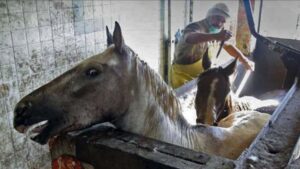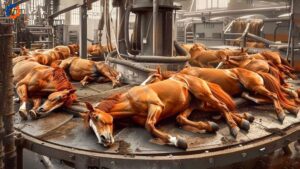The horse processing factory has caught the attention of many people. Horse meat has been used by humans for a long time. However, if you watch the entire video, I believe you’ll be very surprised by what goes on inside the horse meat processing factory.https://youtu.be/_8dH-fQgl2g?si=7qokM-cjIVD5LSY3
For horse processing factories to operate, they need raw materials. It all begins at horse farms, where horses are specially cared for.

Choosing horse breeds for the processing factory
The process of selecting horse breeds is extremely important, as it accounts for 50% of the success in raising horses for meat in the future. Therefore, a significant amount of time should be dedicated to understanding how to select the right horse breed. When choosing a horse, look for those with a long back, straight ears, and large hooves.
The horse breeding and production facility
In horse farming, knowledge of techniques for bathing horses to prevent colds is essential, as well as skills for trimming their hooves. Additionally, understanding nutrition is crucial to ensure that the horse’s diet is rich in nutrients, promoting faster growth and reducing the effort needed for care.
horse harvesting and refining factory
Horse processing factory will frequently visit horse farms to check on the animals. Usually, horses are raised until they reach a certain age, around 8 months to 1 year, at which point they are separated to select the large, beautiful, and healthy ones to sell to horse racing tracks. The less desirable ones will be kept for meat and leather production.
Horse Transportation
Once the horses reach the required size and weight, they are transported to horse meat processing factory . The transportation method usually involves using specialized trucks or semi-trailers.

The rise of horse meat processing factory in modern agriculture: A controversial topic.
Millions of horses, like free winds, gallop along endless fields, much like proud warriors who have accompanied humans through legendary histories. However, as the dawn of modern agriculture rises, horse meat farms are sprouting up like mushrooms after a rainstorm. This has sparked heated debates, with animal rights organizations raising their voices in protest, sounding a warning bell that echoes far and wide.
Despite the criticism, horse meat remains a valuable delicacy, holding its ground in modern agriculture. But what makes this controversial practice continue? Let’s uncover the secrets behind why horse meat persists in today’s world.
The processing facility: The nutrition behind horse meat.
When horses mature, much like hungry clouds, they are constantly in search of high-energy food. They graze on fresh green grass and chew on dry hay, treating them like precious pearls from nature. Oats and barley, often considered golden treasures, provide abundant energy for these tireless warriors. The minerals and vitamins they consume act as “protective charms,” safeguarding their sturdy bones, especially for racehorses and working horses.
In harsher climates, horses require special care, similar to how explorers need protection to survive the challenges of nature. Bathing horses every two weeks serves as a refreshing stream, cleansing their coats without stripping away the natural oils, keeping their fur as smooth as morning mist.
The factory trains horses to have greater strength and faster combat speed.
Horses are like athletes, always eager to move and need regular training to stay in peak condition. When the weather becomes harsh, the treadmill becomes a loyal companion, helping horses relieve stress and maintain their bond with their trainers. Training begins with basic lessons, teaching horses to follow commands and perform light exercises. Just like growing children, they become stronger, preparing for greater challenges, whether it’s a fierce race or an adventurous journey.
The Eyes of the Horse: A Window to Their Soul

When you look into a horse’s eyes, it feels like gazing into a vast, deep ocean, filled with untold stories. Those eyes do more than see; they speak of the journeys they’ve taken, the hardships they’ve overcome with humans by their side. Limiting slaughter and encouraging the protection of horses is a humane act, opening the door to a world where humans cherish the creatures around them.
What Do You Think?
What are your thoughts on this issue? Sometimes, listening to what the eyes cannot say but the heart can feel is the best way to understand our responsibilities toward animals. Share your thoughts with us, as every opinion is a precious gem contributing to building a better world.
The Role of Horse Meat Processing Factory in Modern Agriculture
As this debate continues to unfold, it’s important to understand the role of horse meat processing factory in meeting the demand for this controversial product. By implementing sustainable and humane practices, these facilities can ensure the ethical treatment of horses while providing high-quality meat for consumers.
For more insights into sustainable agriculture practices, visit our YouTube channel here.
Horse Meat Processing Factory: A Controversial Industry
In recent years, horse meat processing factory have become an increasingly present part of the ayoutube.com/@ CÔNG NGHỆ HIỆN ĐẠI-mt4pogricultural landscape. These facilities, where horses are slaughtered for meat, have sparked significant debates between animal rights activists, environmentalists, and those in the agricultural industry. The production of horse meat raises questions about ethics, sustainability, and animal welfare.
The Role of Horse Meat Processing Factory

Horse meat processing factory play an important role in meeting the demand for horse meat, both for domestic consumption and international markets. In some countries, horse meat is considered a luxury item, prized for its tender texture and unique flavor. It is used in a variety of products, from steaks to sausages, and is often marketed as a healthier alternative to beef due to its lower fat content and higher protein levels.
For horse meat to reach consumers, it must undergo a strict processing procedure. Horses are transported to processing factory, where they are humanely slaughtered according to established regulations. The meat is then inspected, cleaned, and prepared for sale, ensuring it meets both safety and quality standards. In some regions, processing factory are also involved in the production of by-products such as leather and bone meal.
The processing plant and ethical considerations and animal welfare.
Despite the economic benefits and demand for horse meat, the practice has faced strong opposition from animal rights groups. Critics argue that horses are sentient animals, deserving of the same ethical treatment as pets and working animals. Many animal welfare advocates believe that the transportation, slaughter, and processing of horses often involve unnecessary suffering and neglect of humane standards.
The debate over horse meat processing often centers around the handling of horses before and during the slaughter process. Long-distance transport to processing factory is particularly controversial, with concerns about the conditions they endure during transit. Ensuring that these animals are treated with respect and care throughout the process is essential to addressing the ethical concerns surrounding the industry.
The environmental impact of horse meat processing factory.
Like other forms of meat production, horse meat processing has an environmental impact. The resources required to raise horses for meat, such as land, water, and feed, contribute to the overall ecological footprint of the industry. However, compared to traditional livestock like cattle and pigs, horses require less land and feed, making horse meat production potentially more sustainable in certain contexts.
Additionally, some argue that horse meat is a more environmentally friendly alternative to beef, as the production of horses generally has a smaller carbon footprint. This is particularly true in regions where horses are already raised for other purposes, such as racing or labor, and are being repurposed for meat production when they can no longer fulfill these tasks.
The Future of Horse Meat Processing factory
As the global food industry continues to evolve, horse meat processing factory will likely remain a point of contention. To ensure the sustainability of this industry, it is essential for processing plants to adopt ethical and environmentally responsible practices. Humane slaughter methods, proper animal welfare regulations, and sustainable farming practices must be prioritized to address the concerns of both consumers and animal rights activists.
As with any controversial industry, the future of horse meat processing will be shaped by public opinion, consumer demand, and evolving regulations. The debate surrounding horse meat will continue to unfold, but one thing is certain: the importance of ethical treatment of animals and sustainable agricultural practices will only grow as global awareness of these issues increases.
For more insights into sustainable agriculture practices and animal welfare, visit our YouTube channel here.
Thank you for following along. See you in the next video!